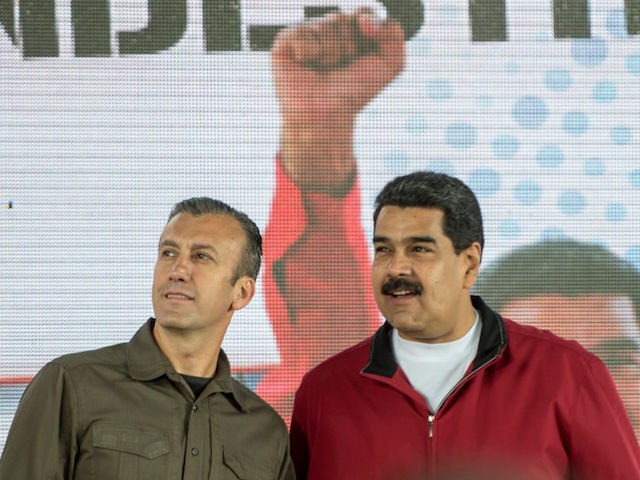The New York Times published a full-page open letter by Venezuela’s Vice President, Tareck El Aissami, on Wednesday, condemning the U.S. Department of the Treasury for sanctioning him as an official “Specially Designated Narcotics Trafficker” for his ties to drug organizations.
The letter, addressed to Treasury Secretary Steven Mnuchin, called the sanctions “illegal and in violation of international law.” El Aissami writes that being labeled a drug trafficker under the Kingpin Act, “beyond any political or geopolitical consideration… constitutes a serious violation against my human rights and seriously damages my dignity and honor.”
“You have been deceived by political interests,” he argues in the letter. “They have built a false-positive case in order to criminalize – through me – the Government of the Bolivarian Republic of Venezuela.”
He goes on to claim that the sanctions do not affect him, however, because “I do not have assets in the United States nor in any other country, and it is pathetic and absurd that an agency of the American administration, without presenting any evidence, can adopt a measure to freeze assets that I do not possess.”
According to the Miami Herald, El Aissami does indeed control $3 billion in now-frozen U.S. assets, either through himself or associate Samark López, also sanctioned through the Treasury initiative.
In announcing the new sanctions, the U.S. Treasury noted that “multiple reports in the past decade have tied El Aissami to groups as varied as the Mexican Zetas cartel and Hezbollah.” It goes on to list “Los Zetas, a violent Mexican drug cartel… Colombian drug lord Daniel Barrera Barrera and Venezuelan drug trafficker Hermagoras Gonzalez Polanco” as among El Aissami’s associates. The sanctions prohibit U.S. citizens from “engaging in transactions or otherwise dealing with” El Aissami, which raises questions regarding how El Aissami could have legally purchased space in the New York Times, an American company.
Reports have for years linked El Aissami to both drug enterprises and terrorist groups. In 2001, the Gatestone Institute has accused El Aissami of “recruiting young Venezuelan Arabs to be trained in Hezbollah camps in Southern Lebanon.” Various associates of the Venezuelan socialist government – including former Hugo Chávez security chief Leamsy Salazar and two of dictator Nicolás Maduro’s nephews – have identified El Aissami as a cocaine trafficker, a high-ranking member of the formidable Cartel de los Soles.
El Aissami’s name has also surfaced as a main organizer of an extensive scheme in which the Venezuelan government provided Hezbollah terrorists with official Venezuelan government documents, such as passports and birth certificates. Such documents would allow a Syrian, Lebanese, or Iranian national to travel with less scrutiny than if they used documents from their native countries. A CNN investigation earlier this month found evidence for Venezuela charging as much as $15,000 per official document.
In response to criticism from the Venezuelan government, Treasury chief Mnuchin said, “this action demonstrates the president’s seriousness about fighting the scourge of drugs in the United States. In addition, he wants to send a clear message to the people of Venezuela that America stands with them.”
Maduro responded by praising El Aissami on national television for having “cojones” and vowing to respond to America’s “aggression” if President Donald Trump does not issue a “public apology” for the sanctions.
The New York Times has entertained requests for space to spread Venezuelan government propaganda for years. In 2015, Maduro bought another full-page ad in the newspaper to defend a series of violent deportations of Colombian citizens, many a part of mixed Venezuelan-Colombian border families, which Colombian President Juan Manuel Santos compared at the time to Nazi activity.
A year before that incident, Maduro himself published an opinion column in the New York Times, blaming the violent repression of peaceful dissidents in his country on right-wing “elites,” though his Bolivarian National Guard (GNB), along with Chavista gangs known as colectivos, were later proved to be responsible for most of the violence during the 2014 protests.
The New York Times also published an opinion piece, a year later, by Leopoldo López, the head of the Venezuelan Popular Will opposition party. López is currently serving a 14-year prison sentence for organizing the protests Maduro defended his violent attacks on in his own Times editorial.
The sanctions against El Aissami are the latest move from the Trump administration signaling a commitment to the fight for freedom in Venezuela. Earlier this month, Trump welcomed Lilian Tintori, López’s wife, to the White House, and published a photo standing beside her in the Oval Office with the caption “Venezuela should allow Leopoldo Lopez, a political prisoner & husband of @liliantintori (just met w/ @marcorubio) out of prison immediately” on Twitter.

COMMENTS
Please let us know if you're having issues with commenting.